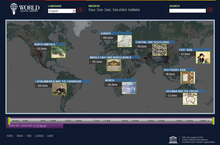World Digital Library
 | |
 The World Digital Library homepage on launch day, April 21, 2009 | |
Type of site | International education |
|---|---|
| Available in | Multilingual |
| Owner | United States |
| Created by | Library of Congress |
| URL | www |
| Commercial | No |
The World Digital Library (WDL) is an international digital library operated by UNESCO and the United States Library of Congress.
The WDL has stated that its mission is to promote international and intercultural understanding, expand the volume and variety of cultural content on the Internet, provide resources for educators, scholars, and general audiences, and to build capacity in partner institutions to narrow the digital divide within and among countries.[1] It aims to expand non-English and non-western content on the Internet, and contribute to scholarly research. The library intends to make available on the Internet, free of charge and in multilingual format, significant primary materials from cultures around the world, including manuscripts, maps, rare books, musical scores, recordings, films, prints, photographs, architectural drawings, and other significant cultural materials.[2][3][4]
The WDL opened with 1,236 items.[5] As of late 2015, it lists more than 12,000 items from nearly 200 countries, dating back to 8,000 BCE.
History and concept
After almost 20 years without participation, the United States re-established its permanent delegation to the United Nations Educational, Scientific and Cultural Organization (UNESCO) in 2003. Dr. James H. Billington, Librarian of Congress, was nominated as a commissioner of the U.S. National Commission to UNESCO and was invited to give a plenary speech at its inaugural conference in June 2005. His speech, entitled A View of the Digital World Library, described a vision in which the rich collections that "institutions, libraries, and museums have preserved could be given back to the world free of charge and in a new form far more universally accessible than any forms that have preceded it."
Google Inc. became the first partner of this public–private partnership and donated $3 million to support development of the World Digital Library in 2005.[6]
Everybody's welcome. This is not a private club. Everybody's welcome to participate and it's all free.
— Dr. James H. Billington,
Library of Congress[7]
At the National Commission's 2006 annual conference, Dr. John Van Oudenaren, Senior Advisor for the World Digital Library at the Library of Congress, outlined a project plan for bringing Dr. Billington's vision to fruition. Foremost was the belief that the World Digital Library should engage partners in planning the four main project areas: technical architecture, selection, governance, and funding. This was achieved in December 2006, when 45 national library directors, library technical directors, and cultural and educational representatives from UNESCO met in Paris to discuss the development of the World Digital Library. The participants formed working groups to address the special challenges of each of the four project areas.
The working groups met in the first half of 2007 and included professionals in the field of digital libraries – including computer science, library and information science, Web development, and fundraising. The working groups presented their findings to the larger WDL group in July 2007. Findings from this planning process were presented at the thirty-fourth session of the UNESCO General Conference in October 2007 in Paris, France.
In early September 2008, the Organization of American States (OAS) agreed to join with the Library of Congress in developing the World Digital Library. Secretary General José Miguel Insulza signed the "Contributor Agreement" with Librarian of Congress, Dr. James Billington, at an OAS headquarters ceremony.
The World Digital Library was launched on April 21, 2009 at UNESCO headquarters in Paris, France.[8][9]
Exhibits
These are really great treasures, not merely miscellaneous things about a country or culture.
— Dr. James H. Billington,
Library of Congress[7]
Initial exhibits include
- The Tale of Genji, an 11th-century Japanese tale considered by some to be the first novel ever written;[10]
- ancient Arabic texts that were used in the formation of algebra;[5] Chinese oracle bone script;[7]
- Ming Dynasty copies of the Yongle Encyclopedia, one of the largest compilations in Chinese literature;[11]
- A printed edition of the Huangdi Neijing dated c. 1115–1234;[12]
- an 8,000-year-old African painting of bleeding antelopes;[13]
- the Waldseemüller map, the earliest map to mention America by name;[13][14]
- the Codex Gigas;[10] Samuel de Champlain's Des Sauvages: ou voyage de Samuel Champlain, de Brouages, faite en la France nouvelle l'an 1603;[10]
- an audio recording of a 101-year-old former American slave, whose grandparents were owned by Thomas Jefferson;[10]
- the first Aztec mention of the child Jesus;[5]
- World War I recruitment posters;[10]
- an 1899 Canadian government handbook for Scandinavian immigrants;[10]
- Doctrina Christiana, en lengua española y tagala, the first Spanish and Tagalog book ever published;[14]
- an Aleutian translation of the Bible by a Russian saint;[14] Islamic manuscripts from Mali;[14] Hyakumanto Darani;[7]
- rare photographs originating in Imperial China, the Ottoman Empire, and Tsarist Russia;[7]
- the first recording of "La Marseillaise;"[7]
- the world's first film from the Lumiere brothers;[7] a photolithographic reproduction of the Constitution of India;[15]
- calligraphy by Prem Behari Narain Raizada;[15] the Huexotzinco Codex;[16]
- and the Nuremberg Chronicle.[17]
Partners
Partners in the World Digital Library project include:[18]
See also
- Chinese Text Project
- Digital Public Library of America
- Europeana
- Global Memory Net
- Internet Archive
- National Digital Library Program (NDLP)
- Project Gutenberg
- World Digital Library-Wikimedia partnership
References
- ^ "About the World Digital Library: Mission". Retrieved April 21, 2009.
- ^ "UNESCO and Library of Congress sign agreement for World Digital Library: UNESCO-CI". portal.unesco.org. Retrieved April 21, 2009.
- ^ "UN puts global treasures online". BBC News. April 21, 2009. Retrieved April 21, 2009.
- ^ Flood, Alison (April 8, 2009). "Free-access World Digital Library set to launch". The Guardian. London. Retrieved April 21, 2009.
- ^ a b c Cody, Edward (April 21, 2009). "U.N. Launches Library Of World's Knowledge". Washington Post. Retrieved April 21, 2009.
- ^ Vise, David A. (November 22, 2005). "World Digital Library Planned". The Washington Post. Retrieved April 21, 2009.
- ^ a b c d e f g "World treasures go on-line in global digital library". Google News. AFP. April 21, 2009. Retrieved April 21, 2009.
- ^ "World Digital Library to launch at UNESCO". AFP via Google News. April 20, 2009. Retrieved April 21, 2009.
- ^ "Library of Congress, UNESCO and Partners to Launch World Digital Library" (Press release). PRWeb. Retrieved April 21, 2009.
- ^ a b c d e f O'Neil, Peter (April 13, 2009). "Website to exhibit world's greatest historical treasures". Ottawa Citizen. Canwest News Service. Retrieved April 21, 2009.
- ^ Yongle Encyclopedia. World Digital Library.
- ^ The Su Wen of the Huangdi Neijing (Inner Classic of the Yellow Emperor). World Digital Library
- ^ a b "UN puts global treasures online". BBC News. April 21, 2009. Retrieved April 21, 2009.
- ^ a b c d "RP book featured in World Digital Library". Agence France-Presse, with Inquirer Research. Philippine Daily Inquirer. April 21, 2009. Retrieved April 21, 2009.
- ^ a b Joshi, Mohit (April 21, 2009). "UNESCO, Library of Congress launch first World Digital Library". TopNews. Retrieved April 21, 2009.
- ^ Flood, Alison (April 8, 2009). "Free-access World Digital Library set to launch". The Guardian. London. Retrieved April 22, 2009.
- ^ "World Digital Library launches with Wellcome treasures". Wellcome Trust. April 20, 2009. Retrieved April 21, 2009.
- ^ "About the World Digital Library: Partners". Retrieved April 21, 2009.
- ^ "Partners – World Digital Library". Archived from the original on April 22, 2009. Retrieved April 22, 2009.
Further reading
- Abid, Abdelaziz (November 2009). "The World Digital Library and Universal Access to Knowledge" (PDF). UNESCO. Retrieved February 27, 2014.
- Oudenaren, John Van (2012), "Beyond Access: Digitization to Preserve Culture" (PDF), Library of Congress, UNESCO
- Oudenaren, John Van (2012). "The World Digital Library". Uncommon Culture. 3 (5/6): 65–71.
- Thorp, Justin (December 2007). "World Digital Library In The Developing World". International Journal of Mobile Marketing. 2 (2): 75–77.
{{cite journal}}:|access-date=requires|url=(help)
